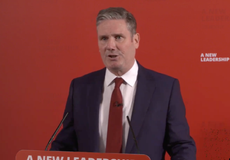Jeremy Corbyn suspended from Labour Party after Antisemitism report
Former party leader has whip removed after refusing to accept findings of antisemitism report
Your support helps us to tell the story
From reproductive rights to climate change to Big Tech, The Independent is on the ground when the story is developing. Whether it's investigating the financials of Elon Musk's pro-Trump PAC or producing our latest documentary, 'The A Word', which shines a light on the American women fighting for reproductive rights, we know how important it is to parse out the facts from the messaging.
At such a critical moment in US history, we need reporters on the ground. Your donation allows us to keep sending journalists to speak to both sides of the story.
The Independent is trusted by Americans across the entire political spectrum. And unlike many other quality news outlets, we choose not to lock Americans out of our reporting and analysis with paywalls. We believe quality journalism should be available to everyone, paid for by those who can afford it.
Your support makes all the difference.Jeremy Corbyn has vowed to fight his suspension from the Labour Party after being stripped of the party whip pending investigation over his response to a damning report on antisemitism under his leadership.
The dramatic move came in response to Mr Corbyn’s refusal to accept all the findings of the Equality and Human Rights Commission and his continued insistence that allegations of antisemitism were “dramatically overstated for political reasons”.
It risked sparking civil war within the party, with former shadow chancellor John McDonnell blasting it as “profoundly wrong” and the left-wing Momentum campaign denouncing it as “a massive attack on the left by the new leadership”.
Unite union leader Len McCluskey called for his ally Corbyn’s reinstatement, branding the suspension “an act of grave injustice which, if not reversed, will create chaos within the party and in doing so compromise Labour’s chances of a general election victory”.
The EHRC report found that under Mr Corbyn’s leadership, Labour broke the law through breaches of the Equality Act involving harassment, political interference in antisemitism complaints and inadequate training for those dealing with cases.
Labour leader Sir Keir Starmer said the publication of the report was “a day of shame” for the party and offered an apology to the Jewish community.
And he told a press conference that anyone dismissing the problem of antisemitism as exaggerated was “part of the problem… and should be nowhere near the Labour Party”.
Follow live: Labour plunged into civil war after Corbyn suspended over antisemitism report
Sir Keir initially ducked pressure for disciplinary action against his predecessor, insisting that the report had made no findings of wrongdoing by individuals, but only about “a collective failure of leadership”.
But it soon became clear that this position was unsustainable in the light of Mr Corbyn’s statement that “one antisemite is one too many, but the scale of the problem was also dramatically overstated for political reasons by our opponents inside and outside the party, as well as by much of the media.”
A party spokesman announced: “In light of his comments made today and his failure to retract them subsequently, the Labour Party has suspended Jeremy Corbyn pending investigation.
"He has also had the whip removed from the Parliamentary Labour Party.”
Mr Corbyn said he will “strongly contest the political intervention to suspend me”.
But he later appeared to indicate he was not planning legal action, saying he would be “appealing to the party and those that have made this decision to kindly think again”.
He again refused to retract his comments, saying that he had merely been pointing out that, contrary to public perceptions, the proportion of Labour members involved in antisemitism was only around 0.3 per cent.
“I’ve explained what I said,” said Mr Corbyn. “I am not diminishing or minimising the issue of antisemitism. It is real, it does exist … and it’s got to be dealt with.”
Although the party insisted that Sir Keir was not involved in the decision to launch the investigation, Mr Corbyn made clear he suspected political interference, saying it was “odd” that it had been announced so quickly.
He called on supporters to “stay in the party to argue the case for economic and social justice in our society”.
The suspension came shortly after the Campaign Against Anti-Semitism announced that it had submitted fresh complaints against Mr Corbyn and 15 other MPs, including in relation to the former leader’s statement today.
The CAA’s chief executive Gideon Falter said that in order to fulfil his pledge to rid the party of antisemitism, Starmer must ensure that the complaints – also relating to former frontbenchers Diane Abbott, Richard Burgon and Barry Gardiner – are investigated “fairly, efficiently and transparently” by a new independent disciplinary process.
The EHRC report found that under Mr Corbyn’s leadership, Labour was responsible for three breaches of the Equality Act, involving harassment, political interference in antisemitism complaints and inadequate training for those dealing with cases.
The party was legally responsible for two cases of “harassment in relation to Jewish identity” because former London mayor Ken Livingstone and councillor Pam Bromley were acting as agents of the party at the time. But the EHRC said there were many other cases involving rank-and-file members, councillors and candidates.
The report found evidence of “inappropriate involvement” from the leader of the opposition’s office in the investigation of 23 out of a sample of 70 antisemitism complaints which it scrutinised – including one concerning the suspension of Mr Livingstone in which Mr Corbyn was named.
It found that the leader’s office closed down an inquiry into a social media message sent by Mr Corbyn as a backbencher, in which he signalled approval for a street mural showing hook-nosed bankers around a table held up by the bodies of the poor.
The EHRC’s interim chair Caroline Waters said there had been “inexcusable” failures, which “appeared to be a result of a lack of willingness to tackle antisemitism rather than an inability to do so”.
The commission made clear that it was outside the remit of its investigation either to determine whether the Labour Party was “institutionally racist” or to make rulings on allegations against individuals.
But lead investigator Alasdair Henderson said: “As the leader of the party at the time, and given the extent of the failings we found and the political interference within the leader of the opposition's office, Jeremy Corbyn is ultimately accountable and responsible for what happened at that time.”
Labour was given a legally binding deadline of 10 December to produce an action plan to ensure it lives up to commitments to be “a political party with zero tolerance of antisemitism”.
Sir Keir accepted all of the EHRC’s findings, saying: “The report’s conclusions are clear and stark – they leave no room for equivocation.”
“Most telling of all: a clear breakdown of trust between the Labour Party, many of its members and the Jewish community. I found this report hard to read and it is a day of shame for the Labour Party, we have failed Jewish people.
“We failed the Jewish people, our members, our supporters and the British public. And so, on behalf of the Labour Party: I am truly sorry for all the pain and grief that has been caused.”
Speaking later after Mr Corbyn’s suspension, the Labour leader said he “fully supported” the investigation into his predecessor’s statement, which had already begun and would be “done properly in accordance with the rules”.
“I made it clear that we won’t tolerate antisemitism or the denial of antisemitism through the suggestion that it is exaggerated or factional,” said Starmer. “That’s why I was disappointed with Jeremy Corbyn’s response and that’s why appropriate action has been taken, which I fully support.”
Jewish former MP Luciana Berger, who quit Labour after being subjected to antisemitic abuse, said she had suffered “an unceasing catalogue of deeply disturbing incidents”, including threats of acid attack, stabbing and rape, and was forced to take measures for her personal safety.
Welcoming Sir Keir’s commitment to implement the EHRC recommendations, she said: “It is in the interests, not only of the Labour Party, but of our entire democratic system and political culture, that left-wing antisemitism is beaten back, and out of the heart of Labour. There is a long road ahead before Labour can recover from this shameful period in its history.”
Labour’s deputy leader Angela Rayner said that she was “really upset that Jeremy wasn’t able to see today the pain that the Jewish community have gone through and the fact that we all – including myself as a member of the shadow cabinet – failed in our duty".
Ms Rayner told BBC Radio 4’s World at One that Mr Corbyn was “a fully decent man” but had “an absolute blind spot and a denial when it comes to some of these issues”.
Labour MP Dame Margaret Hodge, who was subjected to disciplinary action after calling Mr Corbyn an antisemite to his face, said the former leader had “shamed” the party and appeared to be in “permanent denial” about his actions.
She said the suspension was “the right decision”, adding: “Labour is finally saying enough is enough, antisemitism can never be tolerated in our party. Now we can finally move on.”
But Momentum co-chair Andrew Scattergood said: “This suspension risks politicising Labour’s response to antisemitism. It is a massive attack on the left by the new leadership and should be immediately lifted in the interests of party unity.”
Mr McDonnell urged Corbyn supporters to “stay calm” and call upon the leadership to lift the suspension, which he branded “profoundly wrong”.
The Jewish Labour Movement said that the report vindicated its campaign since 2015 to expose “a deepening casual culture of anti-Jewish racism” within the Labour Party.
“Today’s report confirms that our voices were marginalised and our members victimised,” said the group in a statement.
“As set out in forensic detail by the EHRC, the blame for this sordid, disgraceful chapter in the Labour Party’s history lies firmly with those who held positions of leadership – those who possessed both power and influence to prevent the growth of anti-Jewish racism, but failed to act.”
Chief Rabbi Ephraim Mirvis said the report was a “historic nadir” for Labour and said the Jewish community will now work with Starmer to rid the party of "the poison of antisemitism.”





Join our commenting forum
Join thought-provoking conversations, follow other Independent readers and see their replies
Comments